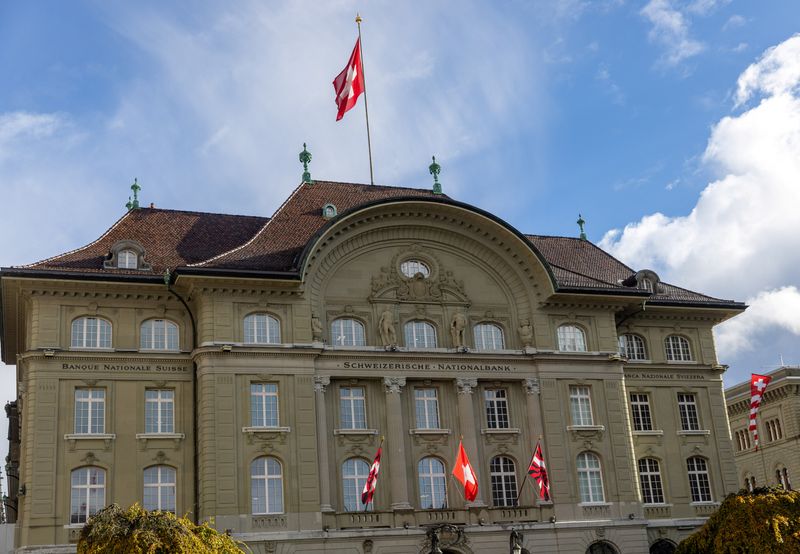
© Reuters. FILE PHOTO: The Swiss National Bank (SNB) is pictured in Bern, Switzerland, November 15, 2023. REUTERS/Denis Balibouse/File Photo
By Indradip Ghosh
BENGALURU (Reuters) – The Swiss National Bank will hold its key policy rate until at least the third quarter of next year, longer than the European Central Bank, despite price pressures having eased, according to the forecasts of a majority of economists polled by Reuters.
Despite a downward trend in inflation, which was within the SNB’s target range of 0-2% for a sixth consecutive month in November, SNB Chairman Thomas Jordan recently said it would not hesitate to tighten monetary policy further if necessary.
Markets have ignored Jordan’s comments and are pricing in the first rate cut to come as soon as March, in tandem with what they expect from the ECB. But most economists in the Dec. 5-11 Reuters poll said rates would remain higher for longer.
While all 31 predicted the Swiss central bank would keep its key policy rate at 1.75% on Dec. 14, after a surprise pause in September, nearly 70% of them, 21 of 31, said the SNB would keep the rate untouched until at least the third quarter.
A significant 45% minority of economists, 13 of 29, predicted the first SNB rate cut would be delayed to December 2024 or later.
That compares with around 57% of economists who forecast the ECB to go for at least one rate cut by end-June, according to a separate Reuters survey last week.
“The SNB is likely on a longer pause than the ECB now,” said Evelyn Herrmann, European economist at Bank of America. “Given the more robust real economy backdrop than in the euro area… We doubt the SNB will be eager to rush into cuts from here.
“Given the central bank’s ‘below 2%’ inflation target remains firmly asymmetric, a broadly unchanged inflation forecast would signal they are nowhere near cuts yet.”
Swiss inflation, currently at 1.4% and one of the lowest among major economies, was expected to average 1.5% and 1.3% in 2024 and 2025, respectively, down from 2.2% this year.
If survey medians were realised, the SNB would not only hold rates longer than the ECB but also start cutting after the U.S. Federal Reserve, which was expected to remain on hold until at least July by a slim majority in a separate Reuters poll.
Also, the predicted 50 basis points of cuts next year from the SNB was less than how much the Fed and the ECB were expected to ease policy.
Higher-for-longer rates could help the Swiss central bank to maintain its bias towards a stronger currency, especially against the euro, as the European Union is its largest trading partner.
The Swiss franc has gained nearly 5% against the euro this year and on Dec. 7 touched its strongest rate of 0.9401 per euro since the SNB discontinued its minimum exchange rate policy in January 2015.
The central bank said in September it was “willing to be active in the foreign exchange market as necessary”. But, given easing inflation, some analysts expect a change in the SNB’s view regarding its FX intervention.
“Due to the further appreciation of the Swiss franc and weaker inflation out-turns, we think a softening of this language is likely. Perhaps the SNB will suggest FX sales are no longer necessary or at a reduced pace,” said George Moran, European economist at Nomura.
The Swiss economy, which expanded 0.3% last quarter from the previous quarter, was forecast to grow 1.2% and 1.4% in 2024 and 2025, respectively, after growing 0.7% in 2023.
(For other stories from the Reuters global economic poll:)
Source: Investing.com


























